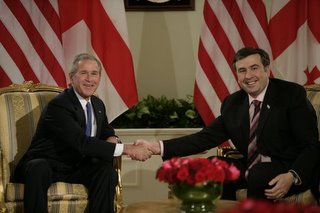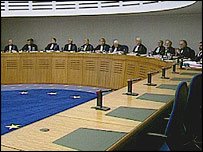
The military monster, aka, the US of A, may be bogged down in Iraq and Afghanistan but that doesn't mean the war of terror doesn't go on. Unless you've been living under a rock, you know the US is gearing up for a 'military campaign' against Iran, who, wouldn't you know it, is on the cusp of acquiring those weapons of mass destruction, in fact, the deadliest of the lot, nuclear, and this has to be stopped. Anyway, this is not a report to debate or lampoon this scenario, alll pretty much a repeat of the Iraqi charade. This is to point to the latest developments in preparing for said attack-to-be. There's an interesting report in the Moscow News saying the U.S. is courting the Caucasus nation of Georgia to use it as a base to launch aerial raids on Iran’s several nuclear sites. The entire report is here.
As readers of the Informant know, Georgia is now led by one Mikhail Saakashvili, a Harvard-trained lawyer and certified Washington stooge. His Velvet Revolution was due to a healthy dose of US pr magic and internet savvy, following the template trailblazed in Serbia and then copied successfully in Ukraine and Kyrgyzstan, and not so successfully in Belarus. That’s not to say that his predecessor, Eduard Shevardnadze, was a saint, but once he put U.S. Caspian oil pipeline plans into doubt, he had to go. And go he did. Saakashvili has been one of the few European leaders to give unquestioned support to the Iraqi war-cum-quagmire. After President Bush was reelected, Georgia announced plans to increase its number of troops stationed in Iraq from 159 to 850. The Washington Times notes that given Georgia’s small population, this increase makes it one of the top contributors on a per capita basis
Saakashvili is now a shameless US backer and Russian basher. Out with the Russians and in with the Americans! During the Soviet era, Krtsanisi military base outside Tbilisi was home to the Red Army. Now it is US soldiers who are in charge and, according to the US Ambassador in Tbilisi Richard Miles, they are in Georgia to stay. In 2002 the Bush administration set up an 18-month, $65m program aimed at training and equipping Georgia's impoverished army.
According to Arms Trade Resource Center,for a country that is slightly smaller than South Carolina, with only 4.6 million citizens, Georgia receives a staggering amount of military support from the United States.
According to the center, in 1997 Georgia received its first FMF grant of $700,000. In 1998, Washington increased FMF more than 7 times over, granting $5.3 million in aid. Since those first years, Georgia has received a total of $107.7 million in FMF grants.[138] The Bush administration requested an additional $12 million in the 2006 budget.
Both Secretary of State Colin Powell and Secretary of Defense Donald Rumsfeld visited Georgia in 2004, pledging continued U.S. support to the country.
Georgia, an aggressive force in a number of border disputes and a state with a well-documented history of human rights violations, does not seem like an ideal candidate for U.S. military aid. Human Rights Watch says the country is, "one of the most corrupt in the world, is desperately short of money, and has a record of persistent and widespread human rights abuses."
The State Department agrees, finding in its most recent Human Rights Report that "nongovernmental organizations blamed two deaths in custody on physical abuse. NGOs reported that police brutality continued, and in certain areas increased. Law enforcement officers continued to torture, beat, and otherwise abuse detainees."
Despite his sycophancy, Saakashvili seems a little weak in the knees about getting involved in the next US attack. Apparently he does not share the unabashed enthusiasm of the Busheviks and feels there could be reprecussions for his small Caucasus nation should it play any role in a U.S. attack on Iran. Stay tuned...


